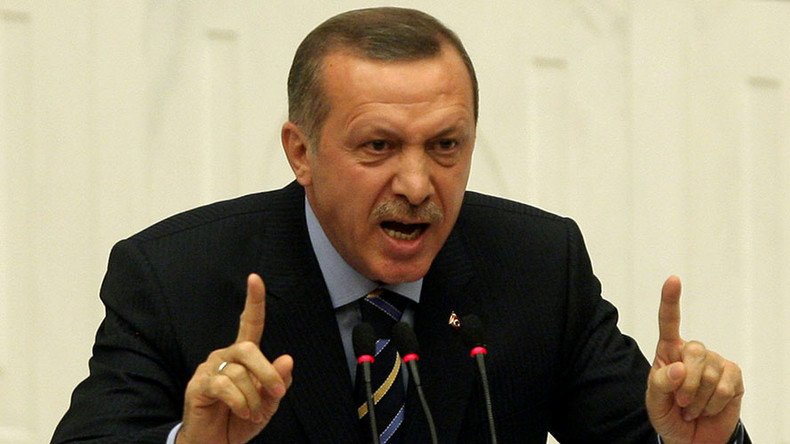‘Journalism in coma, Erdogan controls everything’: Gulenist freedoms advocate on Ankara’s policies

Turkish people can’t access objective news, as journalism is oppressed and controlled by President Recep Tayyip Erdogan, Dr. Y. Alp Aslandogan, who is President of the Alliance for Shared Values and a Board Member of the Gulen Institute, told RT.
Turkish authorities have recently taken a number of steps aimed at suppressing freedom of the press, from taking over Turkey’s biggest newspaper, Zaman, to banning Russia’s Sputnik news agency.
“In short, journalism is in coma in Turkey. Erdogan’s administration doesn’t seem to tolerate any criticism at all. It is impossible to do real journalism in Turkey right now,” Aslandogan said.
“Any journalist, would they criticize Erdogan, risk being imprisoned and legally harassed. Zaman daily was the largest circulating newspaper in Turkey and it is now assigned to a government trustee. It was essentially a politically motivated government takeover. The next day a paper which was critical of Erdogan became Erdogan’s mouthpiece.”
Turkish authorities took control of Zaman in March by appointing new trustees for the Feza Media Group, which owns the paper. Police also raided Zaman’s offices to enforce a Turkish court order stating that the media outlet must be brought under government authority. The newspaper’s editor-in-chief, Abdulhamit Bilici, was fired soon after. The paper has turned into a government mouthpiece since the seizure. Journalists predicted that the paper was doomed to stop publishing within weeks, and human rights groups and politicians slammed the Turkish government, saying that the paper’s takeover was a violation of press freedom.
Aslandogan says that the Zaman case constitutes “the largest assault of the media in Turkey, one of the largest elements of the media suppression” so far.
Reporters Without Borders recently ranked Turkey 151st out of the 180 countries on its 2016 World Press Freedom Index. It has previously condemned the country for being “the biggest prison for journalists in the world.”
However, opposition media has not been the only voice Turkish authorities have been trying to silence.
‘Dangerous, disproportionate’: Sputnik shutdown in Turkey slammed by OSCE, rights activistshttps://t.co/7RJnVlOQdMpic.twitter.com/i4WSGA1rUE
— RT (@RT_com) April 15, 2016
Erdogan’s government has lately stepped up efforts to persecute alleged supporters of exiled preacher Fethullah Gulen, claiming that his sympathizers belong to what it calls the Fethullah Terrorist Organization (FETO) or Parallel State Structure (PDY), a shadowy group accused of attempting to sabotage Erdogan’s government and take power. There is an alternative belief, however, that the “parallel state” is a phantom used by Erdogan as a pretext to suppress the opposition. The 74-year-old Gulen, who has lived in self-imposed exile the US since 1999, denies the existence of any such organization.
A popular preacher and a former imam, Gulen was a firm Erdogan ally as the latter rose to power, but the two men fell out after damaging recordings exposing corruption, illegality, and the incompetence of the Turkish government were leaked in 2013. Since the scandal broke, top police and intelligence chiefs were accused of wiretapping and are currently on trial for the leaks, while Gulen was slapped with a life sentence in absentia for allegedly orchestrating a coup.
Gulen founded a movement known as Hizmet (“service”), which is both a religious and social teaching that has been described as a moderate adaptation of Sunni Islam. The Gulenist movement presents itself as progressive, international, pro-science, pro-multi-party-democracy, and also pro-dialogue in areas such as interfaith relations. With no formal membership, it is unclear how many people are actually in the movement, but varying figures of around several million people worldwide are typically cited in the media.
It is usually said that successful professionals – including businessmen, professors, and journalists, as well as students – form the biggest contingents in the Gulenist ranks. Fethullah Gulen’s dominant authority over the group has drawn criticism, however, and the movement has sometimes been compared to a cult.
Meanwhile, Aslandogan believes Gulen and his supporters were chosen as scapegoats by Erdogan, with the resulting persecution leading to somewhat of a “humanitarian crisis” in Turkish society.
“After the corruption investigation Mr. Gulen’s movement was chosen as scapegoat and labeled as conspirators against Erdogan’s government, which is completely ludicrous. Thousands of people have been detained, hundreds have been jailed, the movement is clearly persecuted, this is a humanitarian crisis in terms of the nature of the actions.”
Report Thy Neighbor? Turkish Consulate asks Dutch citizens to inform on Erdogan critics https://t.co/BqKm4RW1cEpic.twitter.com/JhpNwdm4of
— RT (@RT_com) April 21, 2016
Aslandogan said that, in view of all those violations, Turkey’s desire to become a member of the EU, which it recently pushed for during negotiations aimed at tackling the current European refugee crisis, is never going to be fulfilled. Moreover, he doubts if it is actually on Erdogan’s agenda at all, seeing as the Turkish president has made a “u-turn” on his pro-EU policies and “became increasingly more totalitarian,” while advancing measures that often go “against core EU principles, core democratic principles.”
READ MORE: 'Extremely critical': Austria slams ‘breakthrough’ EU-Turkey refugee deal
“I’m not sure Erdogan himself wants Turkey to become an EU member. That will ultimately curtail a limit on his powers which is something contrary to his recent pattern. EU will not give so much power to an individual without checks and balancing,” Aslandogan argued.
Aslandogan also says that the overall situation with respect to fundamental freedoms in Turkey is only going to worsen unless the Turkish people interfere.
“The fate of the country is up to the people of Turkey. Unless there is an outcry from Turkish people I don’t know how this situation can be resolved. I’m just hoping that Turkish people will awaken to what’s going on.”
READ MORE: New tip for German tourists in Turkey: Make no anti-govt political statements













